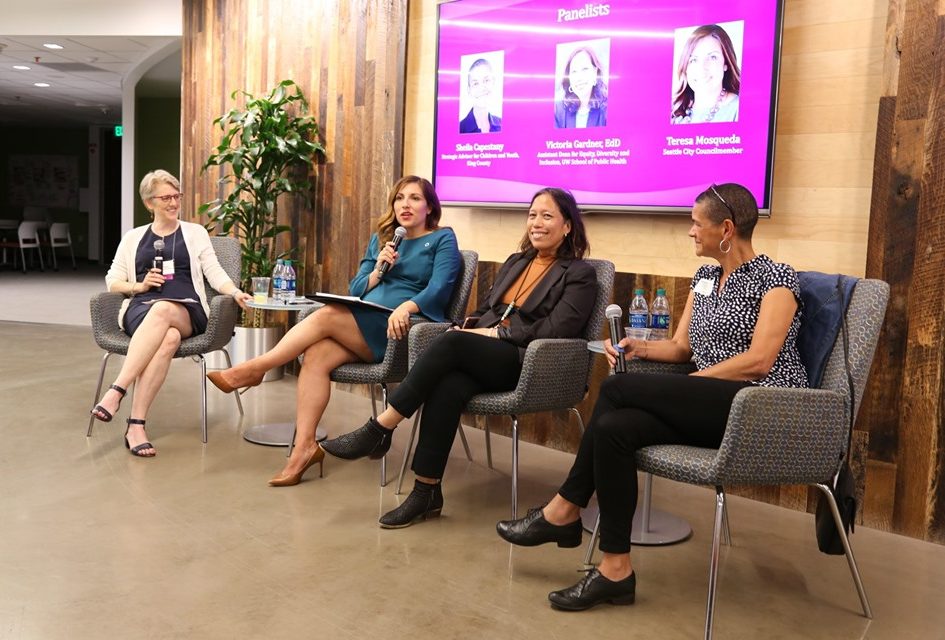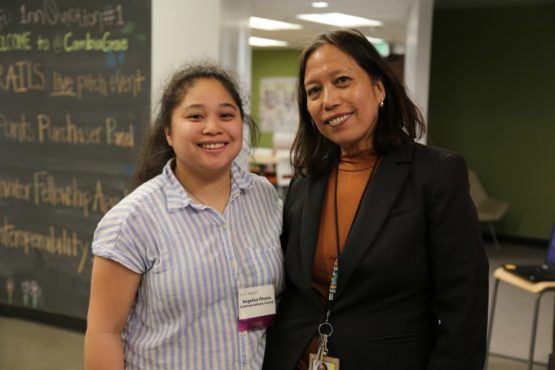June 27, 2019
A Community Conversation Highlighting Health Equity

Last month, WithinReach held its very first Learning Series event centered on health equity and the obstacles families and individuals face when accessing the resources they need. This event featured three inspiring panelists, Dr. Victoria Gardner, Sheila Capestany and Teresa Mosqueda, who each brought unique perspectives about the needed investment in reducing structural barriers that prevent families of color from accessing support.
WithinReach is committed to understanding health disparities, their impact on our communities and how to best improve health and social service systems for all families. This event ties into the equity work we are currently doing and what we plan to accomplish in the next year. The WithinReach Diversity, Equity and Inclusion (DEI) Team seeks to ensure that an equity mindset is applied throughout organizational policies, procedures, programs and decision-making. As a new member of the DEI Team, I hope to use my skills and lived experiences to advance both our work and our staff’s understanding of issues dealing with diversity, equity and inclusion.

Aside from my DEI Team role, I also hold many intersecting identities, some in which I hold power and others in which I face marginalization. For this reason, I gained meaningful insight from the Health Equity event— takeaways that contrastingly reinforced my experiences as a woman of color in our current system, while also addressing the ways in which I can use my privilege to challenge systemic oppression.
One of my major takeaways came from Sheila Capestany, who spoke on “resistance” in terms of individuals being an ally to health equity. “Resistance” comes primarily from white individuals who are resistant to understanding and accepting what life is like day-to-day for a person of color in this country.
According to Sheila, “We will never change any system until individuals get rid of the ‘resistance’ and start to understand that their fellow human beings have suffered under a system that was developed and intended to make them suffer.”
People of color have known that our systems center around “whiteness,” and we have felt the effects of this structure for generations. In this moment, I felt validated, not only because my experiences were acknowledged but because those in power were given the opportunity to be accountable and overcome “resistance” so that our system can benefit everyone and not just a select few.
Recognizing power and privilege in this system was another major takeaway I received from the event. Health equity, according to Dr. Victoria Gardner, is more than just direct health; educational and juvenile justice policies can also affect health outcomes for families of color. As a college graduate, I received the resources that allowed me to be in spaces like the Health Equity event, and my being at this event inevitability put me in a position of power. Recognizing my privilege, I understood that I have a responsibility to not only speak up for other people of color who do not get to sit in the same places as me, but to also make these spaces accessible for them and those who are most affected by systemic oppression.
As well, WithinReach serves in a position of power as a conduit that brings family voices to the attention of the system. With this power, we must ask ourselves, how can we continue to be more equitable as an organization? Acknowledging how each of us can improve and grow is an important step in this evolving process of learning. As I continue to grow at WithinReach and on the DEI Team, I am optimistic that our work will become better prepared to meet the needs of people of color and challenge systems of oppression.
The Learning Series: Health Equity event at Cambia Grove on May 23 was moderated by WithinReach CEO Kay Knox with panelists Sheila Capestany, Strategic Advisor for Children and Youth, King County; Victoria Gardner, EdD, Assistant Dean for Equity, Diversity and Inclusion, UW School of Public Health; and Teresa Mosqueda, Seattle City Councilmember.



